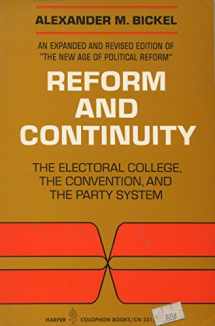
Reform and Continuity: The Electoral College, the Convention, and the Party System
Book details
Summary
Description
In Reform and Continuity the noted constitutional scholar discusses reform of the Electoral College and presidential nominating conventions, with concluding remarks on the judicial status of state statutes that discriminate against minor party activity. In aiming his work at legislators, Bickel adopts a familiar and increasingly popular style, that of the Solon who wants liberal goals, a stance originally pioneered in the news columns of Walter Lippmann. . . . Alexander Mordecai Bickel (1924-1974) was one of the most influential constitutional commentators of the twentieth century. Bickel's most distinctive contribution to constitutional law was to stress what he called "the passive virtues" of judicial decision-making - the refusal to decide cases on substantive grounds if narrower grounds exist to decide the case. Bickel viewed "private ordering" and the voluntary working-out of problems as generally preferable to legalistic solutions. In his books Bickel attacked the Warren Court for what he saw as its misuse of history, shoddy reasoning, and sometimes arbitrary results. Bickel thought that the Warren Court's two most important lines of decision, Brown v. Board of Education and Baker v. Carr, did not produce the results the Court had intended. In his book The Least Dangerous Branch, Bickel coined the term counter-majoritarian difficulty to describe his view that judicial review stands in tension with democratic theory. Bickel envisioned the Supreme Court as playing a statesman-like role in national controversies, engaging in dialogue with the other branches of government. Thus he did not see the Court as a purely passive body, but as one which should lead public opinion, albeit carefully. Bickel was also a gifted and easily accessible instructor. In 1971, he was elected a Fellow of the American Academy of Arts and Sciences and 1972 he inaugurated the DeVane Lectures at Yale where he also taught a large class mostly of Yale undergraduates.


We would LOVE it if you could help us and other readers by reviewing the book
Book review



